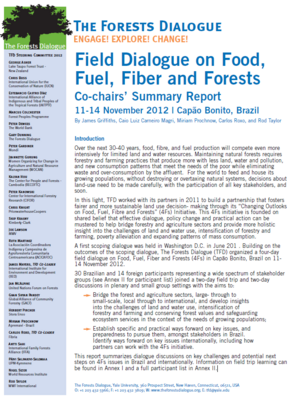Co-Chairs’ Summary: 4F Field Dialogue in Capão Bonito Brazil
Over the next 30-40 years, food, fibre, and fuel production will compete even more intensively for limited land and water resources. Maintaining natural forests requires forestry and farming practices that produce more with less land, water and pollution, and new consumption patterns that meet the needs of the poor while eliminating waste and over-consumption by the affluent. For the world to feed and house its growing populations, without destroying or overtaxing natural systems, decisions about land-use need to be made carefully, with the participation of all key stakeholders, and soon.
In this light, TFD worked with its partners in 2011 to build a partnership that fosters fairer and more sustainable land use decision- making through its “Changing Outlooks on Food, Fuel, Fibre and Forests” (4Fs) Initiative. This 4Fs initiative is founded on shared belief that effective dialogue, policy change and practical action can be mustered to help bridge forestry and agriculture sectors and provide more holistic insight into the challenges of land and water use, intensification of forestry and farming, poverty alleviation and expanding patterns of mass consumption.
A first scoping dialogue was held in Washington D.C. in June 201 . Building on the outcomes of the scoping dialogue, The Forests Dialogue (TFD) organized a four-day field dialogue on Food, Fuel, Fiber and Forests (4Fs) in Capão Bonito, Brazil on 11- 14 November 2012.
30 Brazilian and 14 foreign participants representing a wide spectrum of stakeholder groups (see Annex II for participant list) joined a two-day field trip and two-day discussions in plenary and small group settings with the aims to:
- Bridge the forest and agriculture sectors, large- through to small-scale, local through to international, and develop insights into the challenges of land and water use, intensification of forestry and farming and conserving forest values and safeguarding ecosystem services in the context of the needs of growing populations;
- Establish specific and practical ways forward on key issues, and preparedness to pursue them, amongst stakeholders in Brazil.
- Identify ways forward on key issues internationally, including how partners can work with the 4Fs initiative.
This report summarizes dialogue discussions on key challenges and potential next steps on 4Fs issues in Brazil and internationally. Information on field trip learning can be found in Annex I and a full participant list in Annex II.

